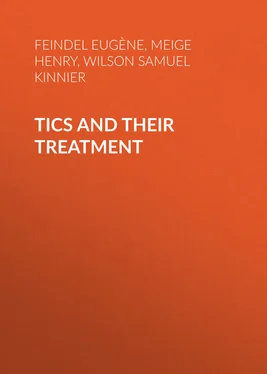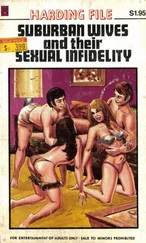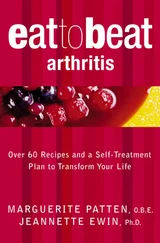Henry Meige - Tics and Their Treatment
Здесь есть возможность читать онлайн «Henry Meige - Tics and Their Treatment» — ознакомительный отрывок электронной книги совершенно бесплатно, а после прочтения отрывка купить полную версию. В некоторых случаях можно слушать аудио, скачать через торрент в формате fb2 и присутствует краткое содержание. Жанр: Здоровье, Медицина, foreign_antique, foreign_language, на английском языке. Описание произведения, (предисловие) а так же отзывы посетителей доступны на портале библиотеки ЛибКат.
- Название:Tics and Their Treatment
- Автор:
- Жанр:
- Год:неизвестен
- ISBN:нет данных
- Рейтинг книги:4 / 5. Голосов: 1
-
Избранное:Добавить в избранное
- Отзывы:
-
Ваша оценка:
- 80
- 1
- 2
- 3
- 4
- 5
Tics and Their Treatment: краткое содержание, описание и аннотация
Предлагаем к чтению аннотацию, описание, краткое содержание или предисловие (зависит от того, что написал сам автор книги «Tics and Their Treatment»). Если вы не нашли необходимую информацию о книге — напишите в комментариях, мы постараемся отыскать её.
Tics and Their Treatment — читать онлайн ознакомительный отрывок
Ниже представлен текст книги, разбитый по страницам. Система сохранения места последней прочитанной страницы, позволяет с удобством читать онлайн бесплатно книгу «Tics and Their Treatment», без необходимости каждый раз заново искать на чём Вы остановились. Поставьте закладку, и сможете в любой момент перейти на страницу, на которой закончили чтение.
Интервал:
Закладка:
I should like, in closing, to be allowed to praise the authors' production; but I can do so only under great reserve, for after so many years of co-operation I can no longer distinguish the work of MM. Meige and Feindel from my own. I think, however, that from many points of view the book which they have written is a most useful one.
E. BRISSAUD.AUTHORS' PREFACE
OUR object in publishing these studies has been twofold: first, to make known various facts of clinical observation, which will always possess at the least an intrinsic value; secondly, to endeavour to assign to the tics their due place among the numerous motor affections consequent on nervous or mental disease. With this end in view we sought to free ourselves of preconceived notions, avoiding at the same time the other extreme of eclecticism. Independently we have been led to adhere to the doctrine hallowed by the authority of Charcot, and since advocated by Professor Brissaud – a doctrine that seems to us to be in harmony with accepted clinical data.
We have thought it advisable to indicate, by the way, more than one misconception whose perpetuation is but a stumbling-block in the path of progress.
Since the eighteenth century the word tic has faced the perils of definition many a time, and has as often all but succumbed. The limits of its application have been alternately enlarged and narrowed to an excessive degree; its original signification has been so obscured that the inclination to-day is either to hesitate in the use of the word at all, or to employ it indiscriminately through ignorance of its real meaning. But if its interpretation be not specified, everything that is said or written on the subject will remain fatally open to dispute. Want of precision in words leads inevitably to confusion of ideas and endless misunderstanding. In this respect the word tic is a great culprit; its promiscuous use implies looseness in its connotation – a fruitful source of controversies which, when all is said and done, are nothing more than regrettable quid pro quos. On fundamental points there is almost complete unanimity of opinion; any divergence is purely superficial, and to be ascribed to disagreement in terms.
Hence it has seemed to us essential to adopt a vocabulary, and to employ any term only after clearly particularising the sense we attribute to it. Our verbal conventions will not meet with universal acceptance, it may be, but we shall be the first to abandon them if common consent assign to the expressions that replace them the exact shade of meaning we meant to convey.
Our work will not be superfluous if we succeed in allotting to the word a definite position in medical terminology, or if any information we have amassed prove of service to future observers. And should we be enabled to demonstrate how unmerited is the reputation the tics enjoy of being irremediable, how they may, on the contrary, be mitigated and sometimes even cured under appropriate treatment, the practical value of the conclusion will, we hope, justify the importance we have attached to the subject.
NOTE BY THE TRANSLATOR
OWING to the kind co-operation of M. Meige, it has been possible to embody in this English version of Les tics et leur traitement his latest definitions and views, as expressed in his monograph Les tics (July, 1905). The passages thus derived are enclosed in brackets. In the making of the translation some of the clinical cases have been slightly abridged, and one or two omitted. The Bibliography has been revised, largely supplemented, and brought up to date. In a short Appendix reference is made to various matters in regard to tic on which discussion has recently centred, subsequent to the publication of Meige and Feindel's book. Indices of names and of subjects have been added.
CHAPTER I
THE CONFESSIONS OF A VICTIM TO TIC
AT the time when the plan of our book was being sketched we decided to introduce the subject with several characteristic clinical documents, since it appeared to us indispensable to preface our definitions with an illustration of the type of affection and of patient that we had in view. The choice was rather bewildering at first; but towards the close of 1901 one of us was put into communication with an individual who is a perfect compendium of almost all the varieties of tic, and whose story, remarkable alike for its lucidity and its educative value, forms the most natural prelude to our study. The history is neither a fable nor an allegory, but an authenticated and impartial clinical picture, whose worth is enhanced by no less genuine facts of self-observation.
O. may be said to constitute the prototype of the sufferer from tic, for his grandfather, brother, and daughter have all been affected, and he himself has not escaped. His grandmother and grandfather were first cousins, and the latter, in addition to being a stammerer, developed tics of face and head; his brother stammers too, while both his sister and his daughter have facial tics, and one of his sons was afflicted with asthma as a youth. The family history therefore more than confirms the existence of a grave neuropathic heredity, an unfailing feature in cases of tic.
O.'s fifty-four years lie lightly on him. His physique and general health are excellent, and devotion to bodily exercise and outdoor sports has enabled him to maintain a vigour and an agility above the average; nor is his intellectual activity any less keen.
His earliest tics – simple facial grimaces and movements of the head – made their appearance when he was eleven years old; notwithstanding, his recollection of their mode of onset is very exact.
I have always been conscious of a predilection for imitation. A curious gesture or bizarre attitude affected by any one was the immediate signal for an attempt on my part at its reproduction, and is still. Similarly with words or phrases, pronunciation or intonation, I was quick to mimic any peculiarity.
When I was thirteen years old I remember seeing a man with a droll grimace of eyes and mouth, and from that moment I gave myself no respite until I could imitate it accurately. The rehearsals were not prolonged, as a matter of fact, and the upshot was that for several months I kept repeating the old gentleman's grimace involuntarily. I had, in short, begun to tic.
Читать дальшеИнтервал:
Закладка:
Похожие книги на «Tics and Their Treatment»
Представляем Вашему вниманию похожие книги на «Tics and Their Treatment» списком для выбора. Мы отобрали схожую по названию и смыслу литературу в надежде предоставить читателям больше вариантов отыскать новые, интересные, ещё непрочитанные произведения.
Обсуждение, отзывы о книге «Tics and Their Treatment» и просто собственные мнения читателей. Оставьте ваши комментарии, напишите, что Вы думаете о произведении, его смысле или главных героях. Укажите что конкретно понравилось, а что нет, и почему Вы так считаете.












